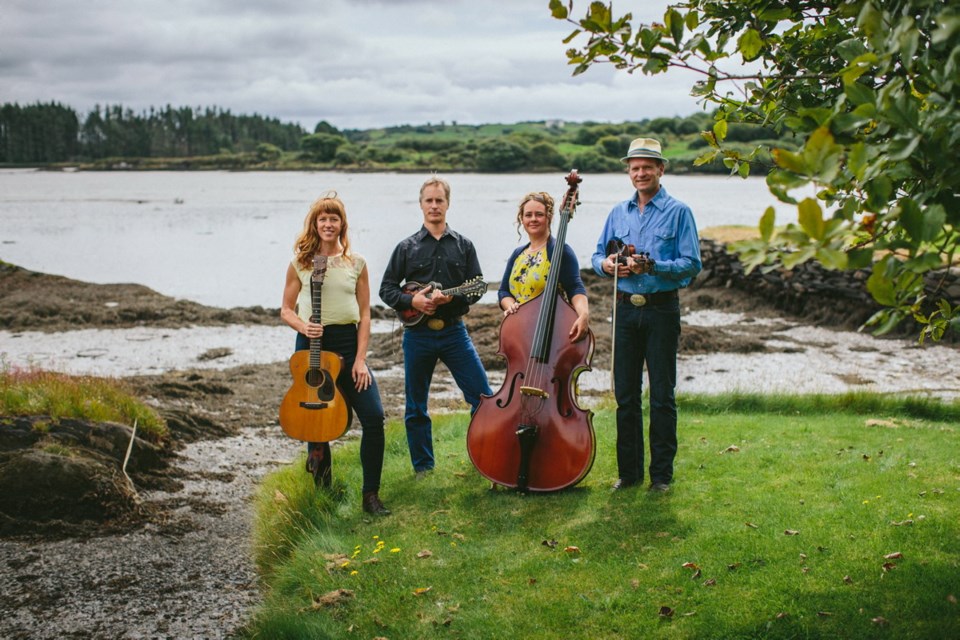IN CONCERT
What: Foghorn Stringband
Where: Hermann’s Jazz Club, 753 View St,
When: Saturday, Jan. 25, 7:30 p.m.
Tickets: $25 from eventbrite.ca; $28 at the door
Music in North America has undergone several generational shifts, with everything from the cost of living and technology to an influx of immigrants playing a role in the past century and a half.
Regional folk-music identities remain strong, however. In some cases, they are practically impervious to trends.
Early Icelandic settlers left an indelible mark on the traditional music of Manitoba. The same could be said for French settlers in Ontario and Quebec, and Irish and Scottish settlers in Nova Scotia, two of the most instantly identifiable folk-music communities in the country.
The concentration of unique folk-music communities in the U.S. is no different, according to Foghorn Stringband singer-bassist Nadine Landry.
“We’re lucky to be able to visit these area and see the richness of the cultures,” Landry said. “When we go to places in Virginia, people will bring their tap shoes. The whole night, all I can hear is tap-tap-tap. But they love it. That’s what they do.
“When we go to North Carolina or West Virginia, and play the repertoire that originates from there, it’s always fun.”
Landry recently moved from Whitehorse, Yukon, back to her hometown on the Gaspé Peninsula, in Eastern Quebec, with Foghorn Stringband singer-fiddler Stephen Lind in tow. Coming home after 20 years, she marvelled at how the music of the area has remained rooted in a certain tradition.
Music of a particular time and place suits Landry and Lind just fine, as their group, which also features Caleb Klauder on vocals and mandolin and Reeb Willms on vocals and guitar, is deemed one of the finest on the traditional bluegrass and country circuit in North America.
Foghorn Stringband was founded in 2000 by Lind and Klauder, who first met as competitors in the National Fiddle Championships in Idaho. The project was moved to Portland, Oregon, where Lind was studying music, and soon after, regular tours commenced.
One trek in 2003 took the group to Juneau, Alaska, where they first encountered Landry, who joined as a permanent member in 2008. Willms was added in 2011, bringing the current lineup into form.
When the group got its start, traditional fiddle tunes and early country music were the foundation. Over time, their influences started showing. The additions of Landry and Willms, who is from rural Washington state, had an immediate impact, as their opinions and musical proclivities were encouraged.
“We never felt it had to stay a certain way,” Landry said. “Stephen and Caleb were really welcoming of other styles. Even though it’s all early acoustic stuff, it’s all slightly different.”
The band is a perfect example of how music can quietly morph over time, based on the backgrounds and experience of its members. The quartet’s strain of pre-copyright Appalachian music, twinned with a strong Cajun influence, got an initial boost from the hugely successful, classic bluegrass and folk soundtrack to the movie O Brother, Where Art Thou?
“You can’t deny that it helped this style of music,” Landry said, although the band has its own unique sound. That sound has been a work in progress, as the four members navigate through their own definitions of what constitutes traditional folk music, Landry said.
“Being from Minnesota, Stephen’s interpretation of old-time music before he got in the band was that it was polka music, because of all the German immigrants in Minnesota. There were really different styles of fiddling and banjo in different parts of the States, but now, with the Internet, resources and field recordings are easily available. You can find a bunch of different players in a bunch of different styles from all over the country.”
Klauder and Lind have learned hundreds of fiddle tunes during Foghorn Stringband’s 20-year run, and have great respect for the fiddlers and field recordings they learned from, Landry said. But it wouldn’t be Foghorn Stringband if they didn’t play around with that tradition, she added.
“There is definitely a lot of respect in their play, but they also crank it up a couple of notches. They might play it faster or with more energy, to put that Foghorn stamp on it.”



